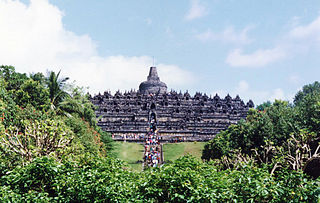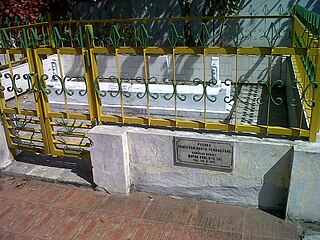Related Research Articles

Kudus is a regency in Central Java province in Indonesia. Its capital is the town of Kudus. It covers 425.17 km2 and is thus the smallest regency on Java Island in area, and it had a population of 777,437 at the 2010 Census and 849,184 at the 2020 Census; the official estimate as at mid 2023 was 872,881. It is located northeast of Semarang, the capital of Central Java.

The Kingdom of Pajang or Sultanate of Pajang was a short-lived Muslim state in Java. It was established by Adiwijaya or Jaka Tingkir, Lord of Boyolali, after a civil war and was a successor to Sultanate of Demak. Adiwijaya claimed to be a descendant of Brawijaya V, the last king of the Majapahit empire, and Trenggana, the sultan of Demak.

The Wali Songo are revered saints of Islam in Indonesia, especially on the island of Java, because of their historic role in the spread of Islam in Indonesia. The word wali is Arabic for "trusted one" or "friend of God", while the word sanga is Javanese for the number nine.
Sunan Kudus, founder of Kudus, is one of the Wali Sanga, of Java, Indonesia to whom the propagation of Islam amongst the Javanese is attributed.

The Demak Sultanate was a Javanese Muslim state located on Java's north coast in Indonesia, at the site of the present-day city of Demak. A port fief to the Hindu-Buddhist Majapahit kingdom thought to have been founded in the last quarter of the 15th century, it was influenced by Islam brought by Muslim traders from China, Gujarat, Arabia and also Islamic kingdoms in the region, such as Samudra Pasai, Malacca and Bani (Muslim) Champa. The sultanate was the first Muslim state in Java, and once dominated most of the northern coast of Java and southern Sumatra.
Sunan Bonang was one of the nine Wali Songo, along with his father Sunan Ampel and his brother Sunan Drajat who are said to have established Islam as the dominant religion amongst the Javanese, Indonesia's largest ethnic group.

Jepara is a regency in the northeast of the Indonesian province of Central Java. It covers an area of 1,020.25 km2 and had a population of 1,097,280 at the 2010 census and 1,184,947 at the 2020 census; the official estimate as at mid 2023 was 1,264,598. Its capital is Jepara town.
Sunan Ampel was one the nine revered Javanese Muslim saints, or Wali Songo, credited with the spread of Islam in Java. According to local history, around Demak the mosque of Demak Masjid Agung Demak was built by Sunan Ampel in 1479 CE, but other sources attributed the construction of the mosque to Sunan Kalijaga.
Sunan Sitijenar is, according to the Babad Tanah Jawi manuscripts, one of the nine Wali Sanga to whom Indonesian legend attributes the establishment of Islam as the dominant religion among the Javanese, Indonesia's largest ethnic group.

Kalinyamat Sultanate or Kalinyamat Kingdom, was a 16th-century Javanese Islamic polity in the northern part of the island of Java, centred in modern-day Jepara, Central Java, Indonesia.

The Java War of 1741 to 1743 was an armed struggle by a joint Chinese and Javanese army against the Dutch East India Company and pro-Dutch Javanese that took place in central and eastern Java. Ending in victory for the Dutch, the war led to the fall of the Sultanate of Mataram and, indirectly, the founding of both the Sunanate of Surakarta and the Sultanate of Yogyakarta.

Ratu Kalinyamat or Ratna Kencana was the queen regnant of Kalinyamat and Jepara, a Javanese Islamic polity on northern coast of Central Java in ca. 1549–1579. She is mainly known for her attack and naval expeditions against Portuguese Malacca.

Raden Patah, also known as Jin Bun was the first sultan of the Demak Sultanate. Ascending to the throne in 1475, he remained a vassal of the Majapahit Empire until 1478. Raden Patah took the title Panembahan Jimbun after legitimizing the Sultanate of Demak as the successor state to the Majapahit Empire, with the Wali Sanga appointing him the Sultan of Demak.
Fatahillah, Fadhillah Khan, or Falatehan was a commander of the Sultanate of Demak who is known for leading the conquest of Sunda Kelapa in 1527 and changing its name to Jayakarta. The conquest of Sunda Kelapa was one of his missions to spread Islam to West Java. He is widely recognized as a national hero in Indonesia.

Arya Penangsang was king of the Sultanate of Demak between 1549 and 1554.

Kudus is the capital and the namesake of the Kudus Regency in Central Java, Indonesia. Its name has an Arabic etymology connected to its foundation by the legendary figure Sunan Kudus. It also houses the mosque established by Sunan Kudus named Menara Kudus Mosque, one of the most important and influential mosques in Indonesia. According to the 2010 census, its population was 92,776, but by mid-2022 this had declined to 88,635.
Panembahan Senapati, formally styled Panembahan Senapati ing Ngalaga Sayyidin Panatagama, was the founder of the Mataram Sultanate.
Arya Pangiri was the duke of Demak who succeeded in becoming the second king of the Pajang Sultanate, who ruled from 1583 to 1586 with the title of Sultan Awantipura. According to the Chinese chronicle of the Sam Po Kong Temple, Ja Tik Su Appointed a prince from Mukming/Raden Mukmin as the King of Demak after the death of Mukming/Raden Mukmin who was killed.
Pati Unus aka Yat Sun known as Pangeran Sabrang Lor (1488–1521) was the second Sultan of Demak who reigned from 1518 to 1521. Pati Unus' real name is Raden Abdul Qadir. He is the crown prince of Raden Patah, the founder of Demak.
Trenggana (1521–1546), also called Trenggono, was the third Sultan of Demak after he succeeded Pati Unus.